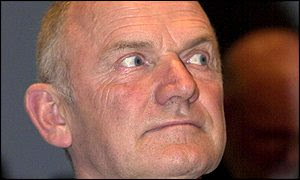Porsche Continues to Purchase Volkswagen Shares
By Chris Haak
03.30.2007
Over the past several months, Porsche has steadily increased its stake in fellow German carmaker Volkswagen. The other day, Porsche acquired an additional 3.6 percent of VW, which increased its stake to 30.9% of voting shares at Volkswagen. Under German law, once a company has acquired more than 30% of another, the acquiring company must make a tender offer to the other shareholders of the company they’re purchasing the stake in to purchase all of the remaining shares. Porsche will do this by offering €100.92 for each ordinary VW share and the legal minimum for all outstanding preference shares, and they’re pretty much ensuring that shareholders will NOT accept this tender offer, because VW shares have recently traded over €117. However, once the offer is made, Porsche does not have to make it again if it decides to further increase its stake. To facilitiate its tender offer, Porsche announced that it has taken a huge €35 billion ($46.67 billion) loan, financed by several banks. The large loan is basically broken into four pieces, or tranches, but the terms are between one and three years – not very long term.
There’s a really interesting, complicated dynamic between these two companies, and the German state in which Volkswagen is headquartered. On one hand, VW chairman Ferdinand Piëch is the grandson of Ferdinand Porsche (the designer of the original VW Beetle) and nephew of Ferry Porsche (the founder of Porsche) and currently owns a large stake in Porsche. Piëch had previously been Chairman and CEO of Volkswagen from 1993 until his retirement in 2002, after which he remained Chairman, so he’s still been influencing the automaker in his “retirement.” Piëch has both a famous ego and a fiery temper, and it’s no secret in the auto industry that his influence was what forced out his successor, Bernhard Pischetsrieder – likely due to the latter’s hesitation to embrace Piëch’s pet projects such as the VW Phaeton luxury car, as well as Piëch’s opposition to Pischetsrieder’s plans to reorganize and streamline the company (which would, in effect, be undoing some of his own “handiwork” from years past).
On the other hand, the German state of Lower Saxony has a law on the book that dates back to the 1960s and prevents a single investor from taking more than a 20% stake in VW common stock. This law was created in the 1960s to shield the newly-privatized Volkswagen from a foreign takeover. Unfortunately for Volkswagen, this law has been challenged by the European Commission in the EU Court of Justice because its anti-competitive, and the law will almost certainly be overturned in the next few years. Porsche has claimed that its motive in purchasing a stake in VW is to protect VW from possible foreign acquisition. By the way, the state of Lower Saxony is Volkswagen’s second-largest shareholder. Porsche has also stated that if the “VW law” were repealed, they would not be compelled to acquire so much of Volkswagen.
There are so many players in this whole scenario, each naturally gunning for their own interests. It will be fascinating to see how this turns out. From an historical standpoint, it’s interesting to see the two companies who got their start from the Porsche family potentially being reunited by Ferdinand Porsche’s grandson. On the other hand, one must wonder whether Porsche and Lower Saxony are looking out for the good of VW’s shareholders – or their own egos. Lower Saxony surely wants to preserve as many jobs as it can, while VW’s current management wants to cut costs and remain free from interference from Porsche (which now holds three seats on VW’s supervisory board; Lower Saxony holds two). Porsche would probably love to have access to some of VW’s purchasing clout, Audi’s know-how (and big TDI diesels from the Q7, which would just happen to fit in the Cayenne). Above all, Piëch probably won’t rest until he’s turned the entire German automotive industry on its ear in a way that suits him, and will help him (in his mind) to cement his legacy as a titan of German industry, along the lines of what his grandfather and uncle were able to accomplish. Do Piëch’s motives, whatever they are, coincide with the best interest of either company? It may take a few years to find out the answer.
COPYRIGHT Full Metal Autos – All Rights Reserved





